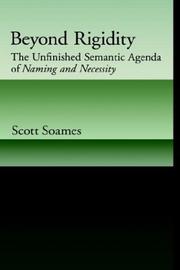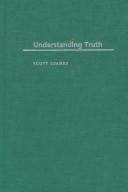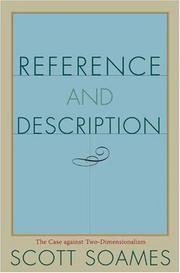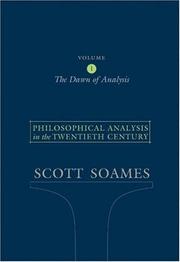| Listing 1 - 10 of 40 | << page >> |
Sort by
|

ISBN: 0195145283 0195145291 1280531819 9786610531813 1423745752 0198033214 1602569711 0199833702 Year: 2002 Publisher: Oxford Oxford university press
Abstract | Keywords | Export | Availability | Bookmark
 Loading...
Loading...Choose an application
- Reference Manager
- EndNote
- RefWorks (Direct export to RefWorks)
Soames introduces a new conception of the relationship between linguistic meaning and assertions made by utterances. He gives meanings of proper names and natural-kind predicates and explains their use in attitude ascriptions.
Philosophy of language --- Kripke, Saul --- Identity (Philosophical concept) --- Reference (Philosophy) --- Necessity (Philosophy) --- Contingency (Philosophy) --- Identité --- Référence (Philosophie) --- Nécessité (Philosophie) --- Contingence (Philosophie) --- Kripke, Saul A., --- 801.56 --- Syntaxis. Semantiek --- Kripke, Saul A. --- 801.56 Syntaxis. Semantiek --- Identité --- Référence (Philosophie) --- Nécessité (Philosophie)

ISBN: 0195123352 0195111516 0199872112 0585324557 9786610453528 1280453524 0198027168 1423760158 9780585324555 9781423760153 9780195111514 9780195123357 Year: 1999 Publisher: New York Oxford University Press
Abstract | Keywords | Export | Availability | Bookmark
 Loading...
Loading...Choose an application
- Reference Manager
- EndNote
- RefWorks (Direct export to RefWorks)
The author of this text explores the notion of truth and its role in our ordinary thought, as well as in logical philosophical and scientific theories.
Truth --- Vérité --- Waarheid --- Truth. --- Vérité --- Conviction --- Belief and doubt --- Philosophy --- Skepticism --- Certainty --- Necessity (Philosophy) --- Pragmatism --- Ethics. --- Deontology --- Ethics, Primitive --- Ethology --- Moral philosophy --- Morality --- Morals --- Philosophy, Moral --- Science, Moral --- Values

ISBN: 0691121001 9780691130996 069113099X 9786612086656 1282086650 1400826454 9781400826452 9780691121000 9781282086654 Year: 2007 Publisher: Princeton, N.J. Princeton University Press
Abstract | Keywords | Export | Availability | Bookmark
 Loading...
Loading...Choose an application
- Reference Manager
- EndNote
- RefWorks (Direct export to RefWorks)
In this book, Scott Soames defends the revolution in philosophy led by Saul Kripke, Hilary Putnam, and David Kaplan against attack from those wishing to revive descriptivism in the philosophy of language, internalism in the philosophy of mind, and conceptualism in the foundations of modality. Soames explains how, in the last twenty-five years, this attack on the anti-descriptivist revolution has coalesced around a technical development called two-dimensional modal logic that seeks to reinterpret the Kripkean categories of the necessary aposteriori and the contingent apriori in ways that drain them of their far-reaching philosophical significance. Arguing against this reinterpretation, Soames shows how the descriptivist revival has been aided by puzzles and problems ushered in by the anti-descriptivist revolution, as well as by certain errors and missteps in the anti-descriptivist classics themselves. Reference and Description sorts through all this, assesses and consolidates the genuine legacy of Kripke and Kaplan, and launches a thorough and devastating critique of the two-dimensionalist revival of descriptivism. Through it all, Soames attempts to provide the outlines of a lasting, nondescriptivist perspective on meaning, and a nonconceptualist understanding of modality.
Description (Philosophy) --- Description (Philosophie) --- Description (Philosophy). --- Philosophy --- Philosophy of language --- Theory of knowledge --- Philosophy. --- Mental philosophy --- Humanities

ISBN: 0691115737 0691115745 9780691122441 9780691123127 069112244X 0691123128 9786612129384 1282129384 1400825806 9786612087301 1282087304 1400825792 9781400825790 9780691115733 9781400825806 9780691115740 Year: 2003 Publisher: Princeton, NJ Princeton University Press
Abstract | Keywords | Export | Availability | Bookmark
 Loading...
Loading...Choose an application
- Reference Manager
- EndNote
- RefWorks (Direct export to RefWorks)
This is a major, wide-ranging history of analytic philosophy since 1900, told by one of the tradition's leading contemporary figures. The first volume takes the story from 1900 to mid-century. The second brings the history up to date. As Scott Soames tells it, the story of analytic philosophy is one of great but uneven progress, with leading thinkers making important advances toward solving the tradition's core problems. Though no broad philosophical position ever achieved lasting dominance, Soames argues that two methodological developments have, over time, remade the philosophical landscape. These are (1) analytic philosophers' hard-won success in understanding, and distinguishing the notions of logical truth, a priori truth, and necessary truth, and (2) gradual acceptance of the idea that philosophical speculation must be grounded in sound prephilosophical thought. Though Soames views this history in a positive light, he also illustrates the difficulties, false starts, and disappointments endured along the way. As he engages with the work of his predecessors and contemporaries--from Bertrand Russell and Ludwig Wittgenstein to Donald Davidson and Saul Kripke--he seeks to highlight their accomplishments while also pinpointing their shortcomings, especially where their perspectives were limited by an incomplete grasp of matters that have now become clear. Soames himself has been at the center of some of the tradition's most important debates, and throughout writes with exceptional ease about its often complex ideas. His gift for clear exposition makes the history as accessible to advanced undergraduates as it will be important to scholars. Despite its centrality to philosophy in the English-speaking world, the analytic tradition in philosophy has had very few synthetic histories. This will be the benchmark against which all future accounts will be measured.
Analysis (Philosophy) --- Philosophy, Modern --- Philosophie analytique --- Philosophie --- Methodology --- -Philosophy --- -Mental philosophy --- Humanities --- Philosophy --- Research --- Analysis, Linguistic (Philosophy) --- Analysis, Logical --- Analysis, Philosophical --- Analytic philosophy --- Analytical philosophy --- Linguistic analysis (Philosophy) --- Logical analysis --- Philosophical analysis --- Philosophy, Analytical --- Language and languages --- Logical positivism --- Semantics (Philosophy) --- History --- -History --- -Methodology --- -Analysis (Philosophy) --- Analysis (Philosophy). --- -Humanities --- Mental philosophy --- -Analysis, Linguistic (Philosophy) --- History of philosophy --- anno 1900-1999 --- Humanities Methodology --- Methodology - History - 20th century --- Philosophy, Modern - 20th century
Book
ISBN: 9780691160726 0691160724 Year: 2014 Publisher: Princeton Princeton university press
Abstract | Keywords | Export | Availability | Bookmark
 Loading...
Loading...Choose an application
- Reference Manager
- EndNote
- RefWorks (Direct export to RefWorks)
Philosophy --- United States --- Analysis (Philosophy) --- Philosophy, American --- History --- Analysis, Linguistic (Philosophy) --- Analysis, Logical --- Analysis, Philosophical --- Analytic philosophy --- Analytical philosophy --- Linguistic analysis (Philosophy) --- Logical analysis --- Philosophical analysis --- Philosophy, Analytical --- Language and languages --- Methodology --- Logical positivism --- Semantics (Philosophy) --- United States of America
Book
ISBN: 1282964968 9786612964961 1400837847 9781400837847 0691136807 9780691136806 0691136815 9780691136813 0691136823 0691136831 1282531441 1400833183 9786612531446 Year: 2009 Publisher: Princeton Princeton University Press
Abstract | Keywords | Export | Availability | Bookmark
 Loading...
Loading...Choose an application
- Reference Manager
- EndNote
- RefWorks (Direct export to RefWorks)
The two volumes of Philosophical Essays bring together the most important essays written by one of the world's foremost philosophers of language. Scott Soames has selected thirty-one essays spanning nearly three decades of thinking about linguistic meaning and the philosophical significance of language. A judicious collection of old and new, these volumes include sixteen essays published in the 1980's and 1990's, nine published since 2000, and six new essays. The essays in Volume 1 investigate what linguistic meaning is; how the meaning of a sentence is related to the use we make of it; what we should expect from empirical theories of the meaning of the languages we speak; and how a sound theoretical grasp of the intricate relationship between meaning and use can improve the interpretation of legal texts. The essays in Volume 2 illustrate the significance of linguistic concerns for a broad range of philosophical topics--including the relationship between language and thought; the objects of belief, assertion, and other propositional attitudes; the distinction between metaphysical and epistemic possibility; the nature of necessity, actuality, and possible worlds; the necessary a posteriori and the contingent a priori; truth, vagueness, and partial definition; and skepticism about meaning and mind. The two volumes of Philosophical Essays are essential for anyone working on the philosophy of language.
Language and languages -- Philosophy. --- Linguistics. --- Semantics. --- Language and languages --- Linguistics --- Semantics --- Formal semantics --- Semasiology --- Semiology (Semantics) --- Comparative linguistics --- Information theory --- Lexicology --- Meaning (Psychology) --- Linguistic science --- Science of language --- Philosophy --- Philosophy.
Book
ISBN: 1400833183 1282531441 9786612531446 0691136823 9781400833184 9780691136820 0691136831 9780691136837 9781282531444 9780691136837 Year: 2009 Publisher: Princeton Princeton University Press
Abstract | Keywords | Export | Availability | Bookmark
 Loading...
Loading...Choose an application
- Reference Manager
- EndNote
- RefWorks (Direct export to RefWorks)
The two volumes of Philosophical Essays bring together the most important essays written by one of the world's foremost philosophers of language. Scott Soames has selected thirty-one essays spanning nearly three decades of thinking about linguistic meaning and the philosophical significance of language. A judicious collection of old and new, these volumes include sixteen essays published in the 1980's and 1990's, nine published since 2000, and six new essays. The essays in Volume 1 investigate what linguistic meaning is; how the meaning of a sentence is related to the use we make of it; what we should expect from empirical theories of the meaning of the languages we speak; and how a sound theoretical grasp of the intricate relationship between meaning and use can improve the interpretation of legal texts. The essays in Volume 2 illustrate the significance of linguistic concerns for a broad range of philosophical topics--including the relationship between language and thought; the objects of belief, assertion, and other propositional attitudes; the distinction between metaphysical and epistemic possibility; the nature of necessity, actuality, and possible worlds; the necessary a posteriori and the contingent a priori; truth, vagueness, and partial definition; and skepticism about meaning and mind. The two volumes of Philosophical Essays are essential for anyone working on the philosophy of language.
Language and languages --- Linguistics. --- Semantics. --- Formal semantics --- Semasiology --- Semiology (Semantics) --- Comparative linguistics --- Information theory --- Lexicology --- Meaning (Psychology) --- Linguistic science --- Science of language --- Philosophy.
Book
ISBN: 9780691146409 9781400833948 1400833949 0691146403 1282936085 9786612936081 9780691156392 0691156395 Year: 2010 Publisher: Princeton Princeton University Press
Abstract | Keywords | Export | Availability | Bookmark
 Loading...
Loading...Choose an application
- Reference Manager
- EndNote
- RefWorks (Direct export to RefWorks)
The tradition descending from Frege and Russell has typically treated theories of meaning either as theories of meanings (propositions expressed), or as theories of truth conditions. However, propositions of the classical sort don't exist, and truth conditions can't provide all the information required by a theory of meaning. In this book, one of the world's leading philosophers of language offers a way out of this dilemma. Traditionally conceived, propositions are denizens of a "third realm" beyond mind and matter, "grasped" by mysterious Platonic intuition. As conceived here, they are cognitive-event types in which agents predicate properties and relations of things--in using language, in perception, and in nonlinguistic thought. Because of this, one's acquaintance with, and knowledge of, propositions is acquaintance with, and knowledge of, events of one's cognitive life. This view also solves the problem of "the unity of the proposition" by explaining how propositions can be genuinely representational, and therefore bearers of truth. The problem, in the traditional conception, is that sentences, utterances, and mental states are representational because of the relations they bear to inherently representational Platonic complexes of universals and particulars. Since we have no way of understanding how such structures can be representational, independent of interpretations placed on them by agents, the problem is unsolvable when so conceived. However, when propositions are taken to be cognitive-event types, the order of explanation is reversed and a natural solution emerges. Propositions are representational because they are constitutively related to inherently representational cognitive acts. Strikingly original, What Is Meaning? is a major advance.
Theory of knowledge --- Logic --- Meaning (Philosophy) --- Proposition (Logic) --- Language and logic --- Philosophy --- Semantics (Philosophy)
Book
ISBN: 9780691160023 9780691160030 0691160023 0691160031 Year: 2014 Publisher: Princeton Princeton university press
Abstract | Keywords | Export | Availability | Bookmark
 Loading...
Loading...Choose an application
- Reference Manager
- EndNote
- RefWorks (Direct export to RefWorks)
This is ... five volumes of a definitive history of analytic philosophy from the invention of modern logic in 1879 to the end of the twentieth century. Scott Soames, a leading philosopher of language and historian of analytic philosophy, provides the fullest and most detailed account of the analytic tradition yet published, one that is unmatched in its chronological range, topics covered, and depth of treatment. Focusing on the major milestones and distinguishing them from the dead ends, Soames gives a seminal account of where the analytic tradition has been and where it appears to be heading. -- from publishers website. Volume 1 examines the initial phase of the analytic tradition through the major contributions of three of its four founding giants--Gottlob Frege, Bertrand Russell, and G.E. Moore. Soames describes and analyzes their work in logic, the philosophy of mathematics, epistemology, metaphysics, ethics, and the philosophy of language. He explains how by about 1920 their efforts had made logic, language, and mathematics central to philosophy in an unprecedented way. But although logic, language, and mathematics were now seen as powerful tools to attain traditional ends, they did not yet define philosophy. As volume 1 comes to a close, that was all about to change with the advent of the fourth founding giant, Ludwig Wittgenstein, and the 1922 English publication of his Tractatus, which ushered in a "linguistic turn" in philosophy that was to last for decades. Volume 2 provides an intensive account of the new vision in analytical philosophy initiated by Ludwig Wittgenstein's Tractatus Logico-Philosophicus, its assimilation by the Vienna Circle of Moritz Schlick and Rudolf Carnap, and the subsequent flowering of logical empiricism. With this "linguistic turn," philosophical analysis became philosophy itself, and the discipline's stated aim was transformed from advancing philosophical theories to formalizing, systematizing, and unifying science. In addition to exploring the successes and failures of philosophers who pursued this vision, the book describes how the philosophically minded logicians Kurt Gödel, Alfred Tarski, Alonzo Church, and Alan Turing discovered the scope and limits of logic and developed the mathematical theory of computation that ushered in the digital era. The book's account of this pivotal period closes with a searching examination of the struggle to preserve ethical normativity in a scientific age.
Theory of knowledge --- Logic --- General ethics --- History of philosophy --- Analysis (Philosophy) --- Philosophy --- Analysis (Philosophy). --- Philosophy. --- History --- 1800-1999.
Book
ISBN: 9780691176925 Year: 2019 Publisher: Princeton (N.J.): Princeton university press
Abstract | Keywords | Export | Availability | Bookmark
 Loading...
Loading...Choose an application
- Reference Manager
- EndNote
- RefWorks (Direct export to RefWorks)
Political philosophy. Social philosophy --- Antiquity --- anno 500-1499 --- anno 1500-1799 --- anno 1800-1999 --- anno 2000-2099
| Listing 1 - 10 of 40 | << page >> |
Sort by
|

 Search
Search Feedback
Feedback About
About Help
Help News
News